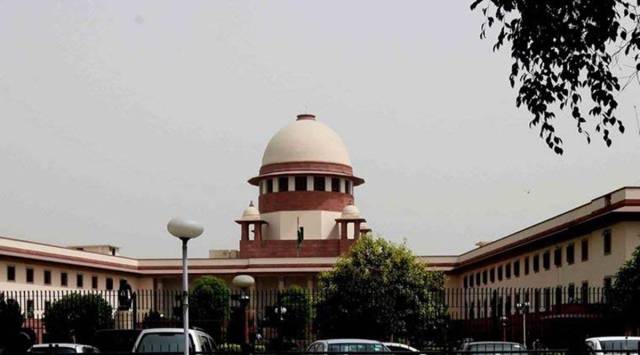- India
- International
Supreme Court: Woman has right of residence in ‘shared household’ of in-laws
The ruling came on a plea by a Delhi resident against an order of the Delhi High Court setting aside a trial court decision allowing his plea to evict his daughter-in-law from the first floor of his property in New Friends Colony.
 The bench also asked senior advocate Mukul Rohatgi, appearing for Tomar, to make a representation to the poll body for loss of time in electioneering due to HC's order.
The bench also asked senior advocate Mukul Rohatgi, appearing for Tomar, to make a representation to the poll body for loss of time in electioneering due to HC's order.“The progress of any society depends on its ability to protect and promote the rights of its women”, the Supreme Court said Thursday while ruling that a woman is entitled to claim right to residence in a “shared household” where she has been living with her husband even if the said premises belongs to his relatives.
A three-judge Bench of Justices Ashok Bhushan, R Subhash Reddy and M R Shah overruled a 2006 judgement of the court and said “In event, the shared household belongs to any relative of the husband with whom in a domestic relationship the woman has lived, the conditions mentioned in Section 2(s) (of The Protection of Women From Domestic Violence Act, 2005) are satisfied and the said house will become a shared household”.
The ruling came on a plea by a Delhi resident against an order of the Delhi High Court setting aside a trial court decision allowing his plea to evict his daughter in law from the first floor of his property in New Friends Colony.
The woman was married to the appellants son in 1995 and they lived on the first floor. In 2004, the husband moved to the ground floor guest room after their relations turned sour. Subsequently he filed a divorce suit and she filed a case under the Domestic Violence Act against the husband Ana parents.
Ruling in favour of the women, the SC dwelt on the rights of women and the circumstances meaning to the passing of the 2005 Act which it described “is a milestone for protection of women in this country”.

“The domestic violence in this country is rampant and several women encounter violence in some form or the other or almost every day, however, it is the least reported form of cruel behavior. A woman resigns her fate to the never ending cycle of enduring violence and discrimination as a daughter, a sister, a wife, a mother, a partner or a single woman in her lifetime. This non-retaliation by women coupled with the absence of laws addressing women’s issues, ignorance of the existing laws enacted for women and societal attitude makes the women vulnerable. The reason why most cases of domestic violence are never reported is due to the social stigma of the society and the attitude of the women themselves, where women are expected to be subservient, not just to their male counterparts but also to the male’s relatives”, the court said.
It said that till 2005, “the remedies available to a victim of domestic violence were limited. The women either had to go to the civil court for a decree of divorce or initiate prosecution in the criminal court for the offence punishable under Section 498-A of the IPC. In both the proceedings, no emergency relief/reliefs is/are available to the victim. Also, the relationships outside the marriage were not recognized. This set of circumstances ensured that a majority of women preferred to suffer in silence, not out of choice but of compulsion”.
“The right of occupation of matrimonial home, which was not so far part of the statutory law in India came to be included in Act, 2005”, it said and pointed out that such a right exists in the audited kingdom.
In its 2006 judgement in the case S.R. Batra Vs. Taruna Batra, a two-judge Bench of the court had disallowed the woman involved from claiming any right to live in the said house since it belonged to mother-in-law of the respondent and did not belong to her husband.
Thursday’s judgement however said this is not the correct law.
We are of the view that this court in S.R. Batra Vs. Taruna Batra although noticed the definition of shared household as given in Section 2(s) but did not advert to different parts of the definition which makes it clear that for a shared household there is no such requirement that the house may be owned singly or jointly by the husband or taken on rent by the husband….The object and purpose of the Act was to grant a right to aggrieved person, a woman of residence in shared household. The interpretation which is put by this Court in S.R. Batra Vs. Taruna Batra if accepted shall clearly frustrate the object and purpose of the Act”, the court said.
However it adds that a suit for eviction of the woman from household would be maintainable before a competent court, but this would depend on the facts of each case.
One most common example for eviction and exclusion may be when the aggrieved person is provided same level of alternate accommodation or payment of rent.,,We need not ponder for cases and circumstances where eviction or exclusion can be allowed or refused. It depends on facts of each case for which no further discussion is necessary in the facts of the present case”.
“In case, the shared household of a woman is a tenanted/allotted/licensed accommodation where tenancy/ allotment/license is in the name of husband, father-in-law or any other relative, the Act, 2005 does not operate against the landlord/lessor/licensor in initiating an appropriate proceedings for eviction of the tenant/allottee/licensee qua the shared household. However, in case the proceedings are due to any collusion between the two, the woman, who is living in the shared household has right to resist the proceedings on all grounds which the tenant/lessee/licensee could have taken in the proceedings”, the judgement added.
Apr 26: Latest News
- 01
- 02
- 03
- 04
- 05








































